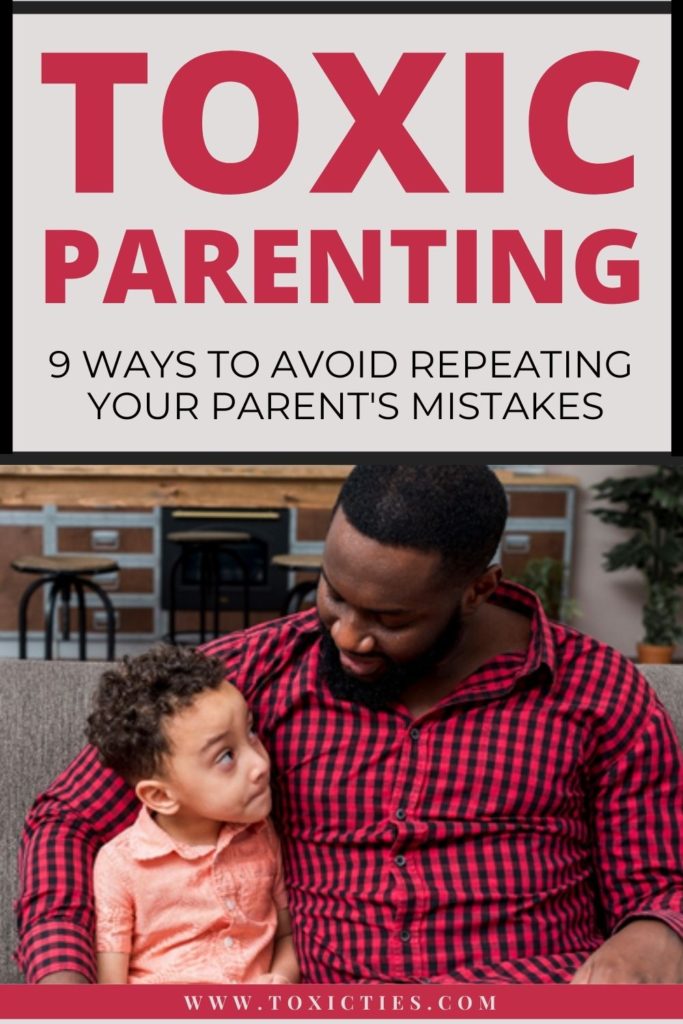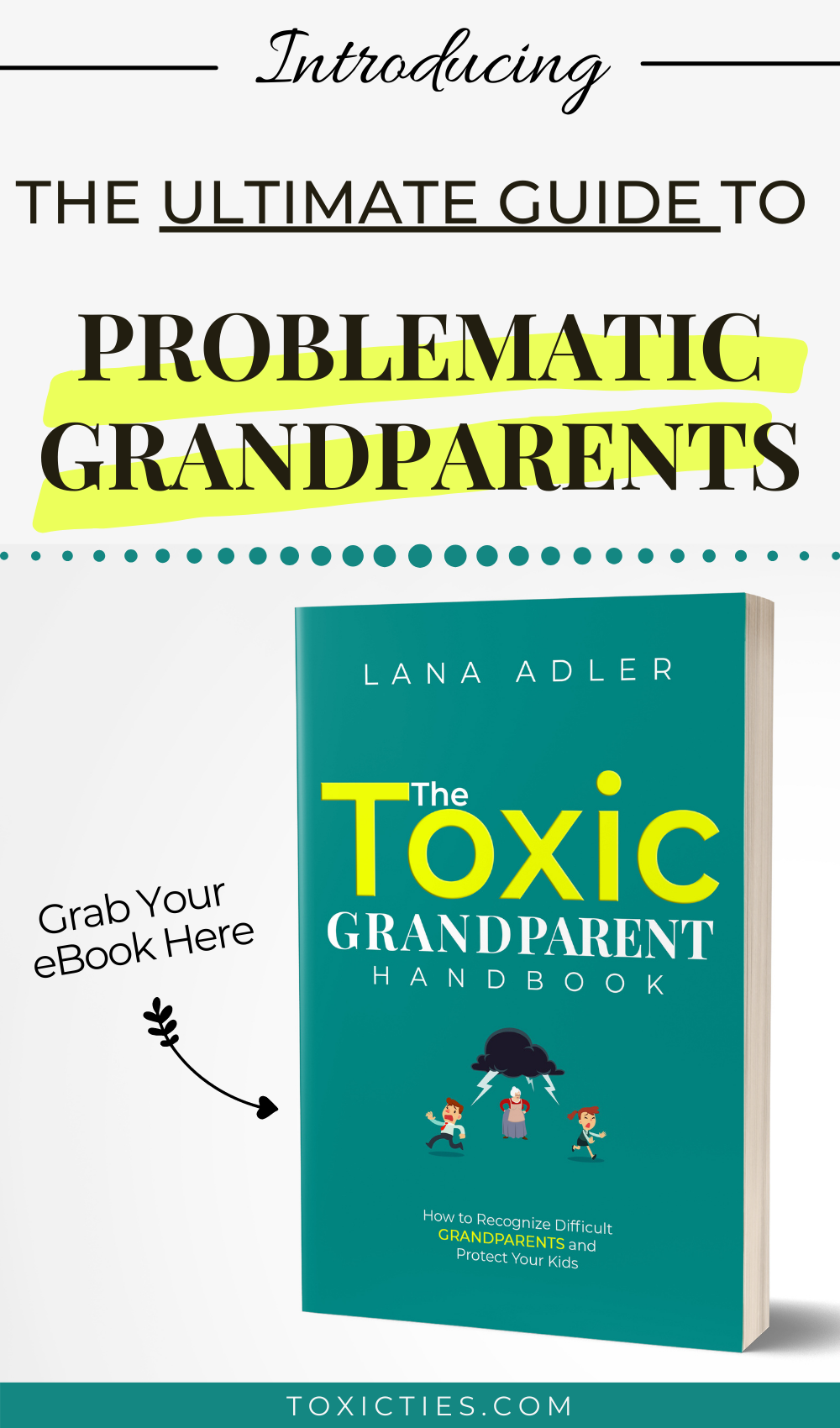Toxic parenting leaves deep scars on a child’s psyche. But what we often don’t realize is that it also gives the child a faulty blueprint for raising their own children. So how do we avoid repeating our parents’ terrible mistakes?
First, we need to understand the full impact of toxic parenting.
The Effects of Toxic Parenting
The typical consequences of toxic parenting are low self-esteem, inability to regulate emotions, and dysfunctional relationship patterns.
In more severe cases, the children of toxic parents may suffer from PTSD, depression, anxiety, substance abuse, and other psychological disorders.
But let’s say you’ve survived your childhood wounds and managed to form a functional, long-term relationship. You’ve even become a parent yourself.
What you may notice now is that sometimes your toxic parent’s “legacy” rears its ugly head. In other words, you may find yourself reenacting your parent’s behaviors in unconscious or uncontrollable ways.
For example, if you grew up with an angry parent, you may realize that you have a short fuse with your child.
This realization may be shocking and unpleasant. You may feel disgusted with yourself, and yet powerless to curb your anger.
Or, if you grew up with a manipulative parent, you might be using guilt, blame, and other emotionally manipulative tactics to influence your children.
Again, you may feel extremely guilty about it. But it’s like you don’t know any other way.
Are You Bound to Repeat the Pattern of Toxic Parenting?
Strictly speaking, we are not bound or fated to anything. A brain is a complicated machine capable of remarkable plasticity. So even the most ingrained behaviors can be changed.
To an extent, what we learn as children set the parameters for our adult lives. But there is also personal experience that constantly reshapes and reorganizes our neural connections.
So, nothing is black and white or predetermined. Even if you’ve had the worst parents imaginable, you can still defy your upbringing and become a wonderful parent to your children.
In fact, a majority of people who come out of difficult childhoods learn to overcome their “toxic programming” and create a healthy family environment.
So what are some of the ways you can make sure not to repeat your difficult parent’s mistakes?
9 Toxic Parenting Mistakes to Avoid

1. Comparing your child to other children
Perhaps, your parent thought that the best way to motivate you to do better is to compare you to other children.
So they praised your peers (siblings, cousins, classmates, even kids they saw on TV) to “push” you to imitate them.
However, shame is a poor motivator. Instead of making you better, it made you feel inferior, inadequate, and sad. Of course, a child can’t verbalize these feelings. You just felt like something was wrong with you.
What to do instead: unfavorably comparing your child to another child is a no-no. Stop that train of thought if you catch yourself thinking: “Timmy plays the piano and my idiot still can’t tie his shoelaces.”
All children are different. It’s your job as a parent to find what’s special and extraordinary about yours and to help them develop it.
2. Assuming you always know best
Perhaps, you remember your parent as always being dismissive of your thoughts and desires.
Every time you expressed what you wanted, your parent overruled you. The implication seemed to be: “You don’t know what you really want or need. I know what’s best for you, so do as I say.”
Of course, when the child is small, the parents make all the decisions. But as we mature, we start acting with more autonomy and self-determination.
However, in toxic family systems, the parents continue to rule their children’s lives even as they become adults.
The parents don’t want to give up their power, so they stifle their child’s growth. As a result, controlling parents often create submissive, codependent people-pleasers or self-destructive rebels.
What to do instead: Cherish and encourage your child’s displays of autonomy.
Does your toddler want to pick out her own clothes? Let her, even if the resulting visual is less than appealing.
She’s a picky eater? Still, give her a choice: would you like broccoli or green peas?
Don’t ever lead with this parenting classic: “Because I said so.” Try to explain your decisions, and instill discipline with love and consistency.
When your child is older, let them pick their own friends, books, college, major, religion, politics…
Take it from your parent: the more you try to control a child, the more they rebel.

3. Imposing your own aspirations on a child
Did your parent push you to become a doctor or a lawyer because that’s what they always wanted to be?
Did they discourage or ignore your natural talents so that you can pursue the path they’ve chosen for you?
Many parents try to live vicariously through their children. That way, they feel that they’re fulfilling their own dream while giving a child an opportunity to be successful at something. It’s a win-win, right?
Wrong. Just because your parent wanted to be a pianist, doesn’t mean it’s what you want, or that it’s what’s best for you.
What to do instead: success in life isn’t defined by how much money you make or how many country clubs you belong to.
Success is a subjective measure of how well you were able to apply your talents to make the world a better place.
A big part of success is deriving meaning and satisfaction from what you do. In other words, if you don’t love your job, you’re not successful, no matter how much money is in your bank.
Success, happiness, and well-being are all closely related to how we feel about ourselves, and whether we’re in harmony with our inner being.
From a young age, children know what they like and what they’re good at. The confusion comes later, when other people start chiming in on what career path they should pursue.
So let your child follow their own aspirations, even if you don’t think they’re “secure” or “realistic.”
Our world is rapidly changing, and there are a lot of professions today that didn’t exist until recently. And yet, these are real, profitable occupations, like blogger, video poker player, virtual assistant, life coach, etc.
Let your child find their own way in this new world. It may be something unique, something you can’t even imagine!

4. Snapping at a child
I grew up with an angry dad. He wasn’t angry all the time but he had a tendency to “snap.” Every time he lost his temper, I felt terrified.
It was so sudden and unpredictable. I never knew what will set him off next. I only knew that the next time is a certainty.
So I became a ball of anxiety and self-loathing. I felt like there was something seriously wrong with me since I’m the only one who evoked my father’s anger.
But what I didn’t realize is that I was also angry. I’ve internalized my father’s rage and it started manifesting when I became a parent.
I yelled at my daughter for small infractions, expecting adult-level responsibility from a small child. I demanded apologies from her as if she understood what she’d done wrong, and placed blame for my volatile emotions on her, as if she made me angry on purpose.
After each snapping episode, I felt crushed by guilt and shame. I felt like I was turning into my father, which is the worst fate I could imagine.
What to do instead: Personally, when I encounter a problem, I try to learn about it, so I can find an educated solution.
I started researching how to be a calmer parent. After all, I don’t want to scar my child for life.
Working on myself took time, and I still snap sometimes (no one’s perfect!). But I find that I can control my anger and irritability much better now.
The biggest thing I learned is to try to have compassion for my child (even when she acts like a spoiled brat) and understand her point of view (even if it makes no sense whatsoever) instead of jumping to punishment or anger.
Here’s how it works. Let’s say your child refuses to clean up her room. You repeat your request and she throws a fit.
You could yell at her, take away her TV for a week, or enforce some other penalty. That’s gonna cause a whole other mess.
Or you could say: “I understand you’re upset right now. Let’s talk about it when you calm down.”
Kids’ brains aren’t fully developed so they easily become emotionally overwhelmed. If you give them time to calm down, you’ll find that they’ll be much more receptive to your words.
You’ll also find that when you make an effort to empathize with your child, it has a calming effect on you, too. So it works on both levels.

5. Never apologizing
Some people believe that being a parent means never having to say you’re sorry.
They think that apologizing to their child undermines their authority and sets a dangerous precedent.
In their mind, once they admit that they’re not infallible gods from Mount Olympus, their child will never respect or listen to them again.
This behavior is typical of narcissistic parents or parents with control issues. It’s a form of emotional abuse.
When a parent refuses to acknowledge that they’ve done something wrong, they invalidate their child’s feelings, dismiss the pain they’ve caused, and fail to resolve a conflict in a way that reassures the child that they are loved and respected.
Instead, the parent makes it seem as if the child is always to blame. That sets the stage for the toxic guilt and the resentment to set in.
What to do instead: God knows, the road of parenthood is paved with mistakes. No one is born knowing exactly how to raise a human being and how to have a perfect balance between love and discipline.
So don’t be scared of apologizing to your kids. It will not make them think less of you.
On the contrary, it will strengthen your bond and empower them to have healthy, mutually respectful relationships with other people in their lives.
Your child will model all her future relationships on the kind of relationship she had with you. So every time you say: “I’m sorry,” you’re teaching her which behaviors are OK and which are not.
You’re also saying: “Hey, I’m not perfect. It’s OK to not be perfect, as long as you take responsibility for your actions and try to make it right.”
This is an important lesson to teach because in our culture kids (especially girls) are under immense pressure to be perfect.

6. Setting unrealistic expectations
Just like unflattering comparisons to other kids, setting unrealistic standards and expectations doesn’t really motivate a child.
It makes them feel like they’re not good enough since their parent is never satisfied with them. It makes them feel like constant failure and disappointment.
If you grew up with a parent like that, you know the pain of not meeting the unrealistic expectations set for you. So how can you make sure you don’t do it to your kids?
What to do instead: There is a difference between high expectations and unrealistic expectations.
High expectations instill confidence in our kids and let them know we believe in them.
In psychology, it’s known as the Pygmalion effect: a tendency to do better when other people expect good performance from you.
Unrealistic expectations, on the other hand, set the stage for failure and, ultimately, the loss of the motivation to succeed. Because eventually, you just give up. Why bother trying if you can never measure up?
For example, it’s reasonable to expect your child to be a good student with mostly As and Bs. It’s unrealistic to expect them to be a straight-A student all the time (which is what happened in my childhood).
So set high expectations that are attainable.
If your child is gifted academically, and they’re nervous about taking a test, let them know that you have all the confidence in the world that they’ll do well.
If your child has musical talent, encourage them to study and excel at playing a musical instrument.
But most importantly, set high standards for yourself, so your child has a role model who strives to be better, works hard, and achieves their goals.
7. Punishing a child for having feelings
There is a terrible tendency in our society to always expect kids to be in a good mood, behave, be polite, and only be upset when parents deem it “reasonable.”
But just like adults, kids have bad days when they are crabby, stubborn, explosive, or whiny.
Good parents understand that. Bad parents don’t. They punish kids for natural emotional expressions. Only a few “approved” moods are allowed.
“Don’t cry or I’ll give you something to cry about!” is a phrase many of us heard as children, although there are some gender variations.
Traditionally, boys are discouraged from displaying sadness, fear, and emotionality in general. Girls aren’t allowed to show anger and other moods that are considered aggressive or unfeminine.
If you grew up with a parent who enforced these restrictions, you may be emotionally closed off or stunted. You don’t trust your emotions and you’d rather not openly express them. When you do, you feel judged.
So what can you do to avoid doing this to your own kids?
What to do instead: No emotion is inherently bad. When you see certain emotions as bad and prevent your child from openly expressing them, you stifle their emotional development and give them the message that some parts of them are unacceptable.
Let your child be angry, but teach them to express their anger in a way that doesn’t hurt anybody. Let them be sad, even if you think there’s nothing to be sad about. Even let them be whiny — it may be their way of asking you for some extra attention.
Give them the freedom to feel whatever they feel, so that they’re not scared of their emotions or confused about them.
And of course, set a good example of direct, responsible, and authentic self-expression.

8. Praising based on results or abilities
“You’re so smart!”
“Good job!”
“You’re such a good helper.”
These phrases don’t exactly scream “toxic parenting,” but they’re not as harmless as they seem.
Many parents make the mistake of praising their kids’ abilities or performance. This is what researchers call “conditional approval.”
If your parent eagerly praised you for your successes but reacted with sharp disapproval and blame when you failed, you know what it’s like.
OK, but what’s wrong with telling your kid: “You’re so smart”? Turns out, positive reinforcement of the child’s innate abilities isn’t all that positive after all.
In fact, “you’re so smart” is one of the most psychologically damaging things you can say to a child.
Researchers say that when you praise kids for their personal qualities (“You’re a genius!”), it creates a fixed mindset that actually turns kids off learning and makes it harder for them to succeed.
Because they believe they’re smart, they feel like everything should be easy for them. But the learning process is rarely easy. It’s full of setbacks and challenges. As a result, these kids avoid difficult tasks or give up too quickly.
So what’s the right way to praise kids?
What to do instead: Recent (2013) research shows that the most effective form of praise that ensures that your kids become successful adults is process-based praise.
In other words, instead of praising kids for their innate abilities or the outcome, you should give generous praise for their effort, and the strategies they came up with to solve problems.
For example, if your child finished a complex puzzle, don’t say: “Wow! You’re so smart. Good job.” Instead, emphasize the effort your child exerted:
“Wow! You really worked hard on this puzzle. I’m proud of you.”
This approach leads children to believe that their success depends on their efforts. It teaches them that if they try harder, they will eventually succeed.

9. Discouraging individual expression
Self-expression is expressing your true, authentic self through words, attitudes, and actions.
Small children express themselves effortlessly and joyfully. But as we grow older, other people’s ideas about who we should be and how we should act start to interfere with our natural self-expression.
That’s something that happens to almost everyone. But if you happen to have a toxic, abusive, or narcissistic parent, matters are much worse.
Toxic parents are all about creating an environment of codependence and total emotional enmeshment.
Emotional enmeshment makes it difficult for you to identify your own desires and needs, make your own choices, set your own goals, and separate from your parent in any way.
Every time you express yourself or try to forge your own path, the parent acts hurt and betrayed. It’s like they’re not happy unless they rule your life.
So you become confused, insecure, and depressed — unable to either win your parent’s approval or stand up to them.

What to do instead: nurture and celebrate your child’s individuality. Show her that everything that’s weird and quirky about her is wonderful. Encourage her self-expression in any way you can.
Here are some ideas:
- ask her about her day, what challenges she had to overcome, and how it made her feel
- let her pick her own clothes, even if it’s not to your taste
- allow her to talk about her feelings without interrupting or minimizing what she’s going through
- give your child her personal space and privacy
- support your child’s interest in arts, sports, dance, or anything else that’s creative and wild

Wrapping It Up
Being a good parent without a proper parenting example isn’t easy. But knowing what NOT to do is just as important as knowing what to do.
You know, from your own experience, not to:
- Compare your child to other children
- Assume you always know best
- Impose your own aspirations on a child
- Snap at your child for being a child
- Never apologize to the child
- Set unrealistic expectations
- Punish the child for having feelings
- Praise based on results or abilities
- Discourage individual expression
Let your intuition guide you and don’t be discouraged when you fall short of perfection. After all, the only difference between a bad parent and a good parent is the willingness to admit mistakes and the determination to do better.
NEXT
10 Boundaries You Need to Set With Your Toxic Parent
How to Forgive Your Parents for Abuse (When They’re Not Sorry)
How to Deal With a Difficult Parent: 7 Strategies to Keep Your Sanity








Leave a Reply